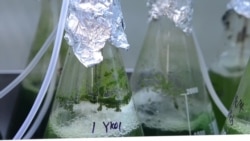HONG KONG —
Scientists in Hong Kong are testing the use of micro algae to clean water waste and produce fuel.
The technology is still too expensive to be broadly developed, but researchers are asking for the government's support in protecting homegrown biofuel against cheaper, foreign competition.
Environmental scientist Ho Kin-Chung from the Open University of Hong Kong says the process of turning algae into energy uses the intrinsic qualities of the plant.
“Algae contains a high quantity of oil and that amount effectively extracted can be refined into very good gasoline, as well as biodiesel and that would be economically very useful,” he said.
For decades, scientists have been looking into biofuels, which use plants as an energy source, as an alternative to petroleum-based fuel.
Despite the huge potential, there is some debate about the impact certain types of biofuel have on land and water resources.
Algae is seen as an attractive choice because it is easy to cultivate, doesn't require much land and can be grown in sea water without using agriculture and drinking water.
Ho says the technology is solid, but it is not yet cost effective. In the market, he says, algae biofuel has to compete with traditional fuels like petroleum or natural gas, which are 30 to 40 percent cheaper.
“We have to consider how to reduce costs, but if we are able to couple the fuel with the sewage treatment we can make it more attractive,” Ho said.
Algae feeds on nitrogen and phosphorous, nutrients which are in excess and need to be removed from waste water. In March, Ho plans tol apply for a $1.3 million grant from the government for a pilot scheme at a water waste treatment plant in Hong Kong.
“Algae is a good idea, but they have a long way to go," said Steve Choi, executive director of Dynamic Progress International, one of the first companies in Hong Kong to commercialize biofuels. "Also they need to change the genes, and you need mass production, in order to cut down the costs. Initially the product would be very expensive."
Dynamic Progress International has been making biodiesel from used cooking oil. At the moment, the company is testing energy-efficient stoves for the Hong Kong and Japanese market.
“Hong Kong can really help," Choi said. "It is a financial city so it is easy to raise money and it is transparent, but we need the support of the Hong Kong government, not just for the research, but a comprehensive program, funding, build a reputation, test the product, all this needs to be part of the program.”
With more than 200 million liters of fuel consumed every day, Choi says, the Hong Kong government should be the one to test local biofuels in its day-to-day operations.
The technology is still too expensive to be broadly developed, but researchers are asking for the government's support in protecting homegrown biofuel against cheaper, foreign competition.
Environmental scientist Ho Kin-Chung from the Open University of Hong Kong says the process of turning algae into energy uses the intrinsic qualities of the plant.
“Algae contains a high quantity of oil and that amount effectively extracted can be refined into very good gasoline, as well as biodiesel and that would be economically very useful,” he said.
For decades, scientists have been looking into biofuels, which use plants as an energy source, as an alternative to petroleum-based fuel.
Despite the huge potential, there is some debate about the impact certain types of biofuel have on land and water resources.
Algae is seen as an attractive choice because it is easy to cultivate, doesn't require much land and can be grown in sea water without using agriculture and drinking water.
Ho says the technology is solid, but it is not yet cost effective. In the market, he says, algae biofuel has to compete with traditional fuels like petroleum or natural gas, which are 30 to 40 percent cheaper.
“We have to consider how to reduce costs, but if we are able to couple the fuel with the sewage treatment we can make it more attractive,” Ho said.
Algae feeds on nitrogen and phosphorous, nutrients which are in excess and need to be removed from waste water. In March, Ho plans tol apply for a $1.3 million grant from the government for a pilot scheme at a water waste treatment plant in Hong Kong.
“Algae is a good idea, but they have a long way to go," said Steve Choi, executive director of Dynamic Progress International, one of the first companies in Hong Kong to commercialize biofuels. "Also they need to change the genes, and you need mass production, in order to cut down the costs. Initially the product would be very expensive."
Dynamic Progress International has been making biodiesel from used cooking oil. At the moment, the company is testing energy-efficient stoves for the Hong Kong and Japanese market.
“Hong Kong can really help," Choi said. "It is a financial city so it is easy to raise money and it is transparent, but we need the support of the Hong Kong government, not just for the research, but a comprehensive program, funding, build a reputation, test the product, all this needs to be part of the program.”
With more than 200 million liters of fuel consumed every day, Choi says, the Hong Kong government should be the one to test local biofuels in its day-to-day operations.





